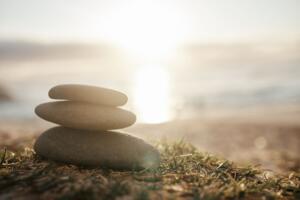When asked the secret to his calm and happy life, a wise guru replied: When I’m hungry, I eat. When I’m tired, I sleep. The answer may seem trite to the point of being trivial. It might even generate annoyance in those of us who are less placid than the guru, but a little thought shows that there is much helpful wisdom in what he says is the secret to a happy life.
When I’m hungry, I eat
It is fortunate that most of us never have to worry about going hungry. Telling us to eat when we are hungry is not a good fit with our lives. However, we can look at this advice from a different angle. ‘When I am not hungry, I don’t eat’ seems to be a much more relevant and useful way to describe the link between our need for food and the satisfying of that need.
Eating is a primal need. Too many people in too many times and places have been faced with the reality or the imminent prospect of going hungry. In a situation where you do not know where your next meal is coming from, or even if it is coming; eating whenever food is available – hungry or not – makes sense. In situations where food is always amply available, it does not.
We no longer eat just because we are hungry. When asked if he was hungry, a friend did not consider his stomach. He looked at his watch. If it was mealtime, he would eat, whether his body indicated a need for food or not. If asked the question, “Can you imagine celebrating anything without food?” most of us, including me, would answer ‘no.’
 Too often we use food to try to satisfy needs or solve problems that we know deep down food won’t solve and that have nothing to do with nourishing our bodies. We eat to be sociable or because it is expected of us. We eat because we are bored or lonely or need a little treat to cheer us up. We all know what happens next. Our clothes start getting tight. The numbers on the scale rise. Our doctor starts looking serious and mentions the possibility or the presence of a nasty disease or health issue.
Too often we use food to try to satisfy needs or solve problems that we know deep down food won’t solve and that have nothing to do with nourishing our bodies. We eat to be sociable or because it is expected of us. We eat because we are bored or lonely or need a little treat to cheer us up. We all know what happens next. Our clothes start getting tight. The numbers on the scale rise. Our doctor starts looking serious and mentions the possibility or the presence of a nasty disease or health issue.
One secret to a happy life? Remind ourselves that eating is both a biological necessity and a pleasure. We will enjoy that pleasure much more if we wait until our body tells us that food would be welcome.
When I’m tired, I sleep
In the middle of a workday, a colleague and I both admitted that we were tired. In a work situation, it is hard to disappear and go for a nap. One reaction to fatigue at work and in other demanding situations is found in most industrialized societies – coffee. Unfortunately, it does not do the job.
Even when we do have the opportunity to rest, we do not always take advantage of it. How often do we exchange an early bedtime for more mindless screen time which both keeps us out of bed longer and harms our sleep when we do hit the pillow? Saying yes to too many family, social or community events (no matter how pleasant or important they may be) can come at heavy cost in terms of our energy levels.
As any traffic cop or ER nurse can tell you, it is when you are tired that accidents happen. The accidents can be anything from miscalculating an important number at work, missing a crucial appointment or crashing your car – mistakes you would be much less likely to make if you were alert and rested.
Just as food satisfies hunger and should not be used for other things, so sleep or rest eliminates fatigue. Caffeine, energy drinks, loud music or other stimulants do work temporarily, but they are like borrowing when you run out of money. In the short run, you get the cash. In the longer run, you have an even bigger debt problem with which to deal.
 Unlike stimulants, sleeping when you are tired or as soon afterward as is feasible, solves the fatigue problem rather than just pushing it off to come back and bite you harder later. Just as a meal when you are hungry is really enjoyed, so a good sleep when you are tired is a pleasure.
Unlike stimulants, sleeping when you are tired or as soon afterward as is feasible, solves the fatigue problem rather than just pushing it off to come back and bite you harder later. Just as a meal when you are hungry is really enjoyed, so a good sleep when you are tired is a pleasure.
Maybe the guru really did have the secret to a happy life.







